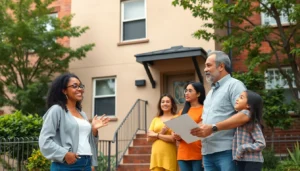Table of Contents
ToggleFinding affordable housing in Atlanta can feel like searching for a needle in a haystack—if that haystack were made of skyscrapers and fancy coffee shops. But fear not! Low-income apartments in the heart of the city offer a glimmer of hope for those looking to call this vibrant metropolis home without breaking the bank.
Overview of Low Income Apartments in Atlanta, GA
Low income apartments in Atlanta offer affordable housing solutions for individuals and families. These apartments primarily cater to residents earning less than 80% of the area median income. A variety of options exist, including studio apartments, one-bedroom units, and larger family-sized apartments.
Specific programs such as the Housing Choice Voucher Program assist eligible individuals in securing rental assistance. Landlords participating in these programs must adhere to guidelines that maintain affordability. Availability may vary, but multiple neighborhoods, including East Atlanta and West End, feature low income housing options.
Affordable housing developments often incorporate amenities such as community centers and recreational areas. Many of these apartments prioritize accessibility, ensuring that residents with disabilities have suitable living conditions. Income requirements are typically based on household size, affecting eligibility criteria.
Potential residents can find listings on websites like the Georgia Department of Community Affairs, which provides up-to-date information on available units. Public housing authorities also maintain databases of low income apartments, granting access to crucial resources.
Affordability remains the primary concern for many seeking housing in the city. Living in a low income apartment can significantly reduce living expenses compared to market-rate rentals. Understanding the application process and required documentation helps streamline securing a unit.
Financial assistance programs may further alleviate the cost of living, enhancing the appeal of these apartments. Engaging with local non-profit organizations can offer additional support in navigating the housing landscape in Atlanta.
Eligibility Criteria for Low Income Housing

Finding low-income housing in Atlanta requires understanding specific eligibility criteria. These criteria focus on income limits and documentation requirements, making it essential to prepare adequately.
Income Limits
Income limits determine eligibility for low-income apartments. Residents typically qualify if their income is at or below 80% of the area median income. For instance, in Atlanta, this limit varies depending on household size. A one-person household must earn less than approximately $52,000 annually, while a family of four can earn up to about $74,000 annually. These limits ensure that rental units remain accessible to those in need. Access to housing programs significantly depends on meeting these income thresholds.
Documentation Requirements
Documentation plays a critical role in the application process for low-income housing. Applicants must provide specific information to verify their income sources. Documents like pay stubs, tax returns, and bank statements are commonly required. Proof of identification, such as a driver’s license or Social Security card, also needs submission. Additionally, applicants should gather any relevant information about household members, including their income. Completing this documentation thoroughly increases the chances of securing a low-income apartment in Atlanta.
Types of Low Income Apartments Available
Various types of low-income apartments exist in Atlanta, catering to diverse resident needs. These options include public housing and subsidized housing, each designed to provide affordable living solutions.
Public Housing
Public housing units offer rental options through the local housing authority. Eligibility for these apartments typically aligns with income guidelines set by the U.S. Department of Housing and Urban Development, ensuring those earning less than 80% of the area median income qualify. They come in various configurations, including one- and two-bedroom layouts suitable for individuals or families. Residents benefit from additional support services like job training and childcare assistance, enhancing their living experience. East Atlanta and West End neighborhoods often host these units, contributing to community development.
Subsidized Housing
Subsidized housing provides rental assistance to lower tenant costs. This program generally helps tenants pay a portion of their rent based on income, making housing more attainable. For many, it reduces monthly rent burdens significantly compared to market rates. Various schemes exist, including the Housing Choice Voucher Program, where residents find approved units in the private market. Many subsidies cover apartments in desirable locations, ensuring access to essential services like public transportation and grocery stores. Programs like these create opportunities for individuals and families to secure stable housing in Atlanta.
Finding Low Income Apartments in Atlanta, GA
The hunt for low-income apartments in Atlanta offers numerous pathways to affordable housing. Various resources simplify the process for individuals seeking assistance.
Online Resources
Websites like the Georgia Department of Community Affairs provide comprehensive listings of low-income apartments. Search tools allow users to filter by location and type of housing. Local non-profit organizations also maintain online databases featuring affordable units. Many listings include vital information, such as rental requirements and amenities. It’s essential to review these platforms regularly, as new openings frequently arise.
Local Housing Authorities
Local housing authorities play a critical role in connecting residents with low-income apartments. The Atlanta Housing Authority specifically manages public housing requests and offers subsidies through programs like the Housing Choice Voucher Program. They ensure compliance with federal income guidelines, facilitating access to affordable options. Residents can visit their offices or websites for detailed information about application procedures and available units. Engaging with these authorities provides valuable assistance in navigating the complex housing landscape in Atlanta.
Benefits of Living in Low Income Apartments
Living in low-income apartments in Atlanta provides several advantages. Affordability stands out as a primary benefit, enabling individuals and families to lower their monthly housing costs. For example, tenants can save hundreds of dollars compared to market-rate units. Lower rent reduces financial stress, allowing residents to allocate funds toward other essential needs like food, transportation, and healthcare.
Access to amenities often comes with low-income housing. Many complexes feature community centers, playgrounds, and shared spaces that foster neighborhood connections. These facilities enhance residents’ quality of life, promoting social interaction and community engagement.
Stability in housing serves as another critical benefit. Low-income apartments offer residents a secure place to live without the fear of sudden rent hikes. This stability is particularly vital for families, as it allows children to remain in school and build lasting friendships.
Support services frequently accompany low-income housing options. Residents may receive resources such as job training programs and childcare assistance. Such services empower individuals to improve their economic situation, contributing to long-term stability and self-sufficiency.
Proximity to essential services enhances the living experience as well. Many low-income apartments are strategically located near public transportation, healthcare facilities, and grocery stores. Convenient access to these amenities supports a more fulfilling lifestyle.
Lastly, participation in local non-profit programs can assist residents. Organizations often provide additional support in navigating resources and finding jobs. Engaging with these groups creates valuable networks for those living in low-income apartments, fostering a sense of community and shared purpose.
Finding low-income apartments in Atlanta offers a viable solution for those seeking affordable housing in a bustling city. With various options available and support programs in place, individuals and families can secure stable living arrangements without breaking the bank. Understanding eligibility criteria and preparing necessary documentation is crucial for a successful application process.
Additionally, the wealth of resources provided by local housing authorities and non-profits can ease the search for suitable units. Living in low-income apartments not only enhances financial stability but also connects residents to community resources and amenities, fostering a supportive environment. Embracing these opportunities can lead to a brighter future for many in Atlanta.







